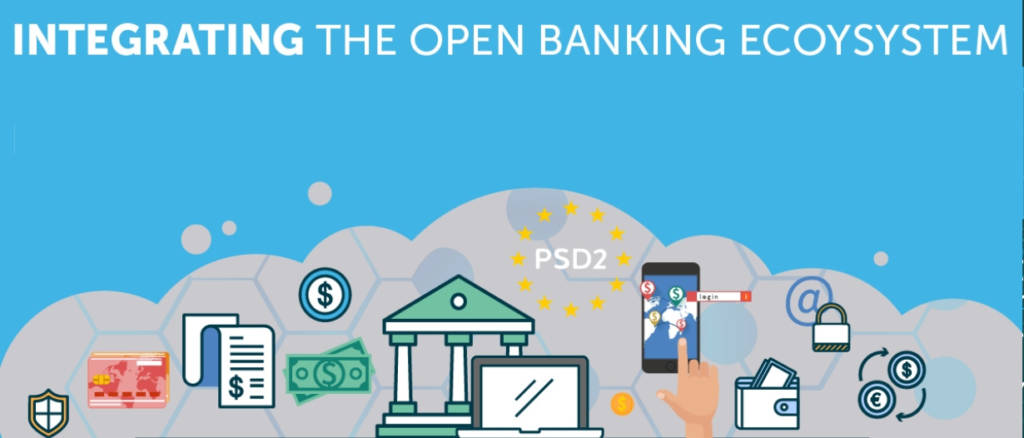Listen to this podcast on Spotify, Apple Podcasts, Podbean, Podtail, ListenNotes, TuneIn
Season 1, Episode 70
Host: Deepesh Patel (DP), Editor, Trade Finance Global
Featuring: Liliana Fratini Passi (LP), Managing Director, CBI
The current banking landscape is going through a makeover. PSD2 and open banking have it’s advantages, but there are also many opportunities to continue to level the playing field, share risks and revisit the rules.
The pandemic has driven the acceleration of open banking, from automatic IBAN and Identifier Checking, to increased partnerships via APIs.

About CBI’s Managing Director
Liliana Passi is the Managing Director of CBI. CBI offers IT infrastructures and digital payments services from a Business-to Business-to-Customer perspective to over 400 domestic and European Payment Service Providers.
The company acts as an aggregator of ecosystems, linking the banking industry with the public administration, corporates, and citizens, facilitating the telematic dialogue among these players.
In addition to her role at CBI, Liliana holds a diverse range of different positions:
- Contributes to the activities of various international standard-setting bodies, such as the United Nations Centre for Trade Facilitation and Electronic Business (UN/CEFACT) where Liliana takes the role of the supporting Vice-Chair of the Pay section of the International Supply Chain Programme Development Area.
- The Italian delegate of UNINFO – the Italian ICT standardization body
- Liaison Rapporteur of the United Nations Economic Commission for Europe (UNECE) to the ISO Technical Committee on Financial Services.
Lastly, Liliana also focuses strongly on promoting gender equality. As a result of this focus, CBI’s Managing Director was featured in the Inspiring Fifty for Italy list, a list comprised of 50 women working in the technology and STEM domain. Most recently, Forbes Italy recognized Liliana as one of the most 100 influential women in the country.
The current banking landscape in Italy?
DP: Can you paint a picture of the current banking landscape in Italy?
LP: Before talking about the Italian banking landscape, I think it is important to underline where we stand as a country today thanks to the efforts promoted by the current government. In my opinion, Draghi is using the “whatever it takes” approach to lead Italy out of the pandemic crisis and provide young generations with a brighter future.
In the second semester, Italy’s Gross Domestic Product (GDP) registered a sensible growth of 2.2 %, outdoing highly industrialized economies such as Germany and France. The country has also done exceptionally well in vaccination rates with 64.3% of the population being fully vaccinated. This data is above the European Union average of 57.8%.
Despite having suffered during the first phase of the pandemic, Italy showed a certain degree of resilience and is now bouncing back. The real challenge, however, will be to make the most out of the EU funds that have been allocated to Italy’s economic recovery.
The Italian banking market has experienced a strong digital acceleration over the last few years. This was noticeable, for example, in the payment sector with the adoption and implementation of the Payment Service Directive 2 (PSD2). The renewed EU regulatory payments framework has paved the way for enhanced competition, allowing new players to become part of the “banking arena”. This is the case of challenger banks, fintech and bigtech companies that have entered the market by offering customized micro-services capable to meet bespoke clients’ needs.
In this competitive scenario, banks have made massive investments to update their business models according to the new technological trends. In doing so, not only have they upgraded their IT systems, but they have also started partnering with fintech and start-ups to provide their clients with innovative solutions.
In addition, banks have made all the necessary efforts to achieve compliance with the renewed payments normative framework, most of them obtaining the fallback exemption by the National Competent Authority, the Bank of Italy. Overall, the developments pursued in the last few years lead me to say that the Italian banking sector has reached an advanced level of maturity, even though it has yet to reach its full potential.
I think that it would be important to keep an eye on the ongoing legislative evolution at the European Union level to understand what trends will be significant in the next 3-4 years.

The importance of open banking
DP: CBI provides an international open banking ecosystem, why is open banking so important?
LP: Open Banking has massively changed the way banking services are created and offered to clients. Before the PSD2, customers used to rely only on traditional banks to get banking-related products, sharing their data with the bank with which they had an account. Open Banking has completely changed this scenario as it is based on a different data-sharing model.
The implementation of the PSD2 in Europe has enabled third-party providers (TPPs) to offer Account Information and Payment Initiation services to banks’ clients. As a result, customers can now utilize these products without directly providing their bank account information.
With this in mind, CBI has developed CBI Globe, an API-powered Reg Tech Platform, which supports 80% of the Italian banking system to meet the operational requirements imposed by the PSD2 and develop services beyond compliance. CBI Globe allows banks to securely share their customers’ online bank account information with more than 180 domestic and foreign TPPs. The platform has facilitated the evolution of the Open Banking market in Italy – since its launch, CBI Globe has registered more than 130 million API calls.
With the aim to go beyond “mere compliance”, CBI equipped CBI Globe with an active functionality, that enables Payment Service Providers to operate as third-party providers, according to the clauses of the PSD2.
Overall, in the renewed payments ecosystem, customers now have the ability to choose among a variety of services offered by a large array of players. This is particularly advantageous for clients as they can benefit from customized products designed to increase the user experience especially with the provision of real-time services.
Customer demand for global digital transformation
DP: Market participants are now pushing for a global digital transformation, is this driven by COVID-19?
LP: There is no doubt that Covid-19 has fostered digitalization worldwide. However, it would be imprecise to claim that market participants have adopted trends towards digitalization only due to Covid-19.
It is worth noting that the PSD2 was adopted in 2015 and implemented in 2019 in Italy. Therefore, the change towards an increased digital financial sector started occurring before the current global health crisis. Even before 2020 – to quote the Retail Payments Strategy of the EU – the act of paying had become less visible and increasingly dematerialized and disintermediated.
However, it is not a secret that Covid-19 further incentivized the transition towards the use of digital technologies. For instance, customers have started utilizing e-payments as a safe tool to make transactions. By allowing customers not to be physically present in a store, digital payments have enabled people to avoid occasions of infection while allowing them to retain pre-pandemic purchasing habits.
Nonetheless, the European market is still fragmented. This is why I believe it important to support the efforts proposed by the European Commission to promote instant payment solutions and innovate within the retail payment markets by reviewing the PSD2 and focusing on an open finance legislative framework. If managed properly, advanced technologies can be a driving force towards the digital transformation of the European economy and society.

The rise in fraud and security concerns
DP: With the exponential increase in fraud cases during the pandemic, should clients be concerned about potential data privacy issues, and how has CBI been addressing the rise in fraud?
LP: Data privacy is a very delicate issue, that deserves to be carefully managed to safeguard the integrity of the clients’ data and avoid any breaches. Advanced digital technologies offer opportunities on an international scale and facilitate market integration. On the other hand, the collateral effect of advanced technologies is that they can be used as a tool to spread cyber threats.
Nonetheless, in my experience, banks and payment service providers have high-security mechanisms and measures in place to mitigate this challenge.
CBI is on the same wavelength. This is why the company has created services that are based on the highest level of security to protect clients’ data and reduce the risks of fraud. I am delighted to state that CBI’s customers and shareholders have shown satisfaction with the way security has been designed and implemented in the services offered by the company.
A breakdown of Check IBAN
DP: How do clients benefit from the increased ability of banks to share information instantaneously?
LP: The possibility to share data with a large variety of banking and non-banking institutions creates a large number of benefits. Imagine, for instance, a retail customer that wants to request and receive a loan in real-time or subscribe to online micro insurance that can be activated at the exact moment of the subscription – with open banking this becomes a reality. Not to forget the possibility to make instant payments, which entails the possibility to transfer or receive funds between bank accounts in less than a few seconds. These solutions offer multiple advantages to customers and underline, once again, the centrality of the customer in the open finance scenario.
Talking about instant services, at the beginning of the pandemic CBI created a value-added service: Check IBAN service. This service connects the banking system with the public administration and corporates. Through this functionality, these industry players can check in real-time the correctness of the association between an IBAN and a fiscal code or vat number provided by a natural or legal entity.
When the association is correct, the public administration can issue fiscal bonuses to the requiring party, whereas the corporate allows a customer to sign a contract after having checked the validity of the data provided by the same customer as well as pay a refund to a final user in a secure way (e.g. insurance companies). If the association is wrong (data has not been correctly associated or is missing), however, players on the supply side are made aware of the outcome instantaneously.
This service has supported the public administration in providing entitled citizens and enterprises who were negatively affected by the Covid-19 crisis with fiscal bonuses. The service is now also offered to the private sector, thus supporting corporates in the process of onboarding their clients.
I would also like to underline the necessary links between efficiency and security. Providing real-time services should always go hand in hand with security measures to ensure the safety of online transactions made by customers.

The ferocious competition of the Italian banking sector
DP: Over 80% of Italy’s financial services already use CBI Globe, what is deterring the remaining 20% from adopting the CBI ecosystem?
LP: I would like to recall the difference between the UK and Italian Open Banking markets. Open Banking in the UK was the result of the establishment of the Open Banking Implementation Entity in 2016. Conversely, CBI Globe is a market-driven initiative backed by the Bank of Italy, which was launched by CBI in 2019 to aid the Italian banking industry in meeting the technical and operational requirements imposed by the PSD2.
CBI Globe is recognized as a best practice service in Europe, having been able to gather such a relevant constituency (around 300 banks) at the domestic level. Additionally, it is worth underlining that more than 180 third-party providers use CBI Globe to carry out their Open Banking activities, thus connecting with the totality of the Italian banking community. Hence, it is possible to affirm that CBI Globe has been able to reduce market fragmentation and be in line with the priority pointed out by the European institutions.
To answer your question on the remaining 20%, it is important to note that the banking market is characterized by a high degree of innovation and competitiveness. As a result, other players have decided to develop their own software and IT solutions to meet the requirements of the PSD2. This is the case of Unicredit, which represents 15% of the Italian Banking Market.
The rest of the domestic financial community, namely the 5%, has opted for different Open Banking platforms due to already existing business connections with other commercial and IT partners.
It is not easy to provide you with a unique reason as to why 20% of the market has decided to choose other options. What I am able to share with you is my satisfaction with the work done by CBI so far to provide the banking system with a solid and cutting-edge API-powered platform that helped member financial institutions save around 40% of the investment costs to achieve compliance with the PSD2. Furthermore, thanks to CBI Globe, Italy is now the country with the best practice for Open Banking in the pan-European landscape.
Smart onboarding could help mitigate the risk of fraud
DP: Onboarding new clients on an individual basis can be a lengthy and expensive process. How can smart onboarding and IBAN checking help banks handle this inevitable challenge? And how can clients also benefit from this value-added service?
LP: This is right, onboarding processes can be lengthy especially if processed manually. This process when done manually can be subject to human errors, therefore, multiple checks need to be made in order to assess the accuracy of the data provided by clients.
CBI aims to streamline these procedures to the benefit of banks and their clients. This is why CBI has come up with the Smart Onboarding service. This service leverages APIs as an IT protocol to exchange real-time information. Smart Onboarding offers corporates the possibility to streamline the onboarding processes, by receiving clients’ data by the financial intermediary possessing this information. Data is collected by enabling the user to fill in an online form in which they can add their personal details (e.g. ID data, email address, mobile phone number, etc.).
The strength of the service lies in the capacity to link the banking community with corporates, allowing for seamless and real-time data sharing between two different ecosystems. Furthermore, by enabling corporates to receive accurate and reliable data, this service offers the possibility to reduce the risk of fraud.

How regulation can lead to innovation
DP: The level of fintech industry regulation has been debated, with some stating the regulation is too tight. What is your view on regulation, and is regulation needed for innovation?
LP: We live in the EU, which is a geographic area where markets are led by regulations. Therefore, I think that the role of the EU legislator is incredibly important to guide market players towards a safe and level playing field among incumbent and new market players.
Regulation is leading innovation in fields that are not yet covered by the current legal framework. This is the case of the legislative proposals comprised in the Digital Finance Package, with a particular focus on the proposed regulations under the Digital Operational Resilience Act (DORA) and the Market in Crypto-Assets (MiCA). DORA will govern the digital operational resilience of financial intermediaries, thus imposing rules for the management of ICT risks. Similarly, MiCA will discipline the use of blockchain technology and crypto-assets in the EU market, providing financial service providers with legal certainty and bespoke rules on the way to proceed in the years to come to develop safe and innovative crypto-asset solutions.
Without these pieces of legislation, it would be more challenging to have a coherent approach throughout the whole European Union.
Therefore, I think that legislation is a necessary condition for the development of a single digital market. Furthermore, I am also looking forward to seeing the result of the review of the PSD2 and the proposal of an open finance regulation, which is supposed to be issued in mid-2022.
CBI and CRIF partnership explained
DP: CBI has recently partnered with CRIF, a company that specializes in advanced digital solutions for business development and open banking. How did this partnership come about?
LP: CBI and CRIF, identified an opportunity to enrich the quality of services provided by the two companies and make the most out of the open finance landscape. The goal of this partnership was, and still is, to provide cutting-edge services, including personal and business financial management solutions, instant lending, and credit scoring functionalities. These solutions will enable the two companies to broaden the array of products offered to retail and corporate clients. By going beyond compliance foreseen by the PSD2, CBI and CRIF are willing to offer advanced functionalities that are able to serve the interests of customers and lead enterprises towards sustainable growth.
The future of CBI
DP: What is next for CBI and for open banking?
LP: Needless to say that CBI is aiming to promote the expansion of CBI Globe in the international market. CBI is currently liaising with other relevant international stakeholders and launching partnerships accordingly. Considering the value-added of services promoted by CBI Globe and the emerging opportunities offered by the financial services market, I think that the upcoming months will see CBI at the forefront of innovation.
I would like to recall the efforts made by the company to develop value-added services from a business-to-business-to-consumer perspective. This aspect is extremely relevant for the competition of the banking community as it allows Payment Service Providers to reach out to a variety of stakeholders, including the public administration, corporate and retail customers to offer cutting-edge and competitive functionalities.
In my opinion, Open Banking will need to evolve towards a more balanced paradigm, in which a level playing field is achieved among all market players. This scenario would entail the application of the principle “same activities, same risks, same rules”, thus leading non-banking players operating in the payments sector to share data with traditional market players (i.e. banks).
I would like to underline the importance of the legislative evolution which is taking place at the European level. The proposed renewal of the eIDAS regulation, together with the Digital Finance Package and the Digital Service Package will provide the market with new rules to generate innovation and govern competition, enabling consumers to access financial services and providers to benefit from a less fragmented Digital Single Market. This will pave the way for market-driven initiatives based on existing and new standards which will facilitate the exchange of financial messages and foster the use of instant services as the new norm.
 Australia
Australia Hong Kong
Hong Kong Japan
Japan Singapore
Singapore United Arab Emirates
United Arab Emirates United States
United States France
France Germany
Germany Ireland
Ireland Netherlands
Netherlands United Kingdom
United Kingdom






Comments are closed.